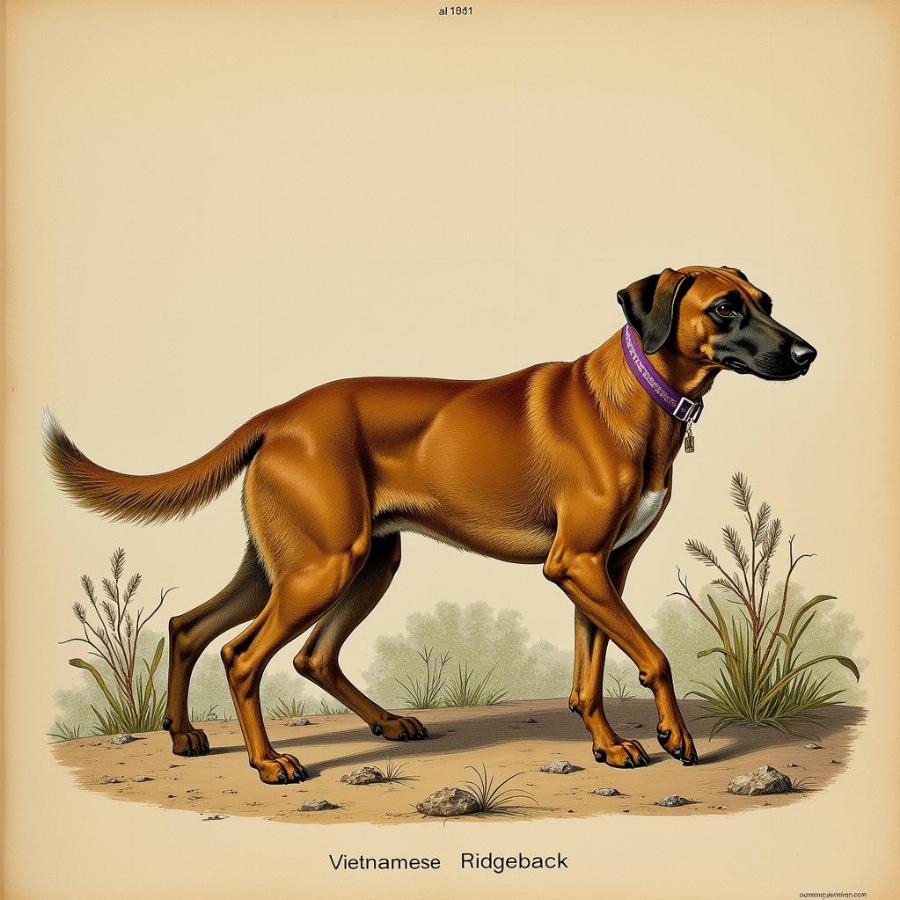The Vietnamese Ridgeback Dog, a breed steeped in history and mystique, is gaining popularity worldwide. Known for its distinctive ridge of back-growing hair, this ancient breed is much more than just a striking appearance. This comprehensive guide dives deep into the world of the Vietnamese Ridgeback, exploring everything from their unique characteristics and temperament to their specific care needs. Whether you’re considering welcoming a Ridgie into your home or simply curious about this fascinating breed, this guide will provide you with valuable insights.
Understanding the Vietnamese Ridgeback’s Unique Temperament
Vietnamese Ridgebacks are known for their intelligence, loyalty, and independent nature. They are affectionate and devoted to their families, but can be reserved with strangers. This natural aloofness makes them excellent watchdogs, a role they’ve traditionally filled for centuries. Their intelligence also makes them quick learners, though their independence can sometimes translate into a stubborn streak during training. Early socialization is crucial for Ridgies to ensure they develop into well-adjusted adults who are comfortable in various situations. They are generally good with children within their own family but may require supervision with younger kids due to their size and strength.
Is a Vietnamese Ridgeback Right for You?
This breed isn’t for everyone. Their independent nature requires a confident owner who can provide consistent leadership. They thrive on routine and clear boundaries. Potential owners should be prepared for the commitment involved in owning a Ridgie, including providing ample exercise, mental stimulation, and proper socialization.
Caring for Your Vietnamese Ridgeback
Vietnamese Ridgebacks are relatively low-maintenance in terms of grooming. Their short coat requires minimal brushing, but regular nail trims and dental care are essential. Like all breeds, they also need regular veterinary checkups to ensure they stay healthy.
Exercise and Mental Stimulation
Ridgies are energetic dogs that require a significant amount of exercise. Daily walks, runs, or playtime in a securely fenced yard are crucial for their physical and mental well-being. They also benefit from engaging in activities that challenge their intelligence, such as puzzle toys, obedience training, and agility courses. A bored Ridgie can become destructive, so keeping them mentally stimulated is key.
Nutritional Needs
Feeding your Vietnamese Ridgeback a high-quality diet is essential for their overall health and longevity. Consult with your veterinarian to determine the best type and amount of food for your dog’s specific age, activity level, and any health conditions.
Training Your Vietnamese Ridgeback
While intelligent, Vietnamese Ridgebacks can be independent and strong-willed. Positive reinforcement methods work best with this breed. Consistency and patience are key. Early socialization and obedience training are essential to ensure they develop into well-behaved companions.
Socialization is Key
Exposing your Ridgie to a variety of people, places, and situations from a young age will help them develop into a confident and well-adjusted dog.
“Early socialization is paramount for a well-rounded Vietnamese Ridgeback,” says renowned dog trainer, Sarah Miller. “It helps them adapt to different environments and reduces the likelihood of behavioral issues later on.”
The History of the Vietnamese Ridgeback
The Vietnamese Ridgeback’s history is shrouded in mystery, with origins dating back centuries. They are believed to have descended from ancient pariah dogs and were primarily used for hunting and guarding in Vietnam. Their unique ridge of hair is a distinguishing feature that sets them apart from other breeds.
A Rare Breed with a Rich Heritage
The Vietnamese Ridgeback was relatively unknown outside of Vietnam until recent decades. Today, they are gaining popularity worldwide as people discover their unique qualities.
 Vietnamese Ridgeback Dog History and Origin
Vietnamese Ridgeback Dog History and Origin
Conclusion
The Vietnamese Ridgeback Dog is a unique and fascinating breed. From their striking appearance to their loyal and independent nature, they offer a rewarding companionship for the right owner. By understanding their specific needs and providing them with proper care, training, and socialization, you can ensure a long and happy life together with your majestic Ridgie. Remember, responsible ownership is key to enjoying the many joys this special breed has to offer.
FAQ
- Are Vietnamese Ridgebacks good with children? They can be good with children within their own family, but supervision is recommended, especially with younger kids.
- How much exercise does a Vietnamese Ridgeback need? They require a significant amount of daily exercise, including walks, runs, and playtime.
- Are Vietnamese Ridgebacks easy to train? They are intelligent but can be independent, so positive reinforcement and consistency are key.
- What is the lifespan of a Vietnamese Ridgeback? Their average lifespan is around 12-14 years.
- Are Vietnamese Ridgebacks hypoallergenic? No, they are not considered hypoallergenic.
- Do Vietnamese Ridgebacks bark a lot? They are known to bark when necessary, but not excessively.
- What kind of grooming do Vietnamese Ridgebacks need? They require minimal grooming, primarily brushing and regular nail trims.